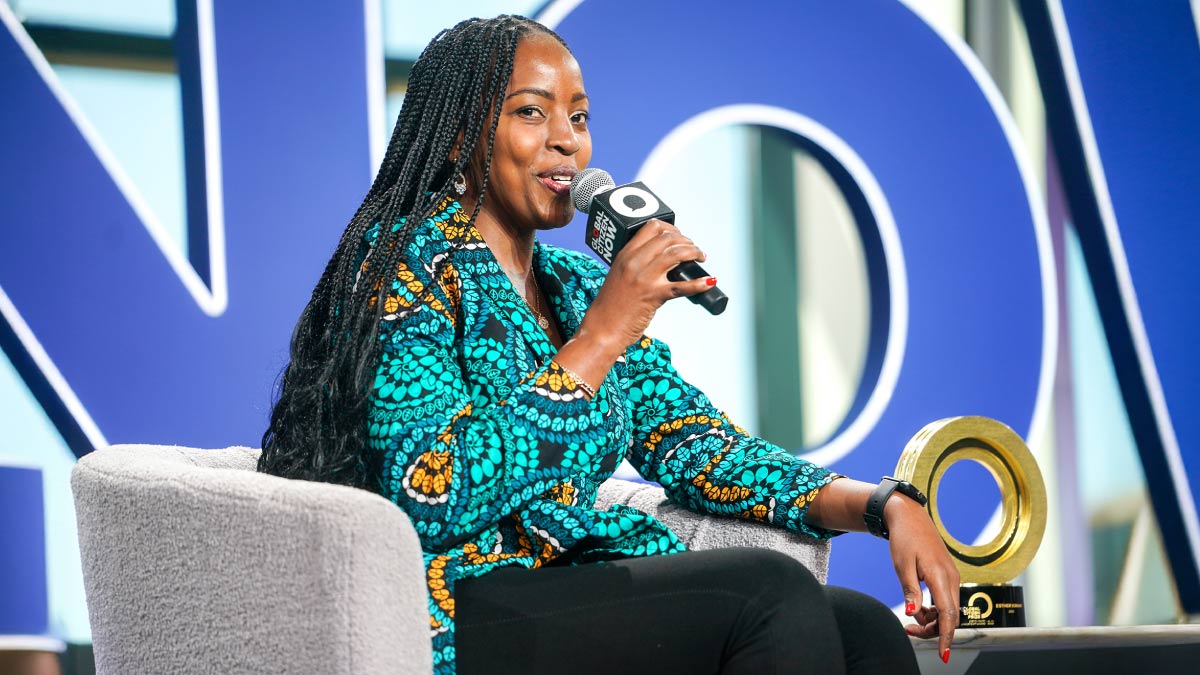When the Biden administration highlighted the nation’s extreme shortfall in cybersecurity talent at a White House summit in July, Cisco was ready — with a pledge to train 200,000 new security workers in the next three years.
The Cisco Networking Academy is the engine that will drive this diverse new workforce.
The world’s largest and longest-running tech skills-to-jobs education program of its kind, Cisco Networking Academy has been leveling the playing field for millions of people since 1997 — often from underserved and underrepresented groups — with IT, networking, and cybersecurity skills that translate into real-world opportunities.
In a wide-ranging interview, Laura Quintana, vice president and general manager of the Cisco Networking Academy, shared her passion for changing lives around the world, while supporting the tech and security innovators of tomorrow.
Thank you, Laura! I’m sure you were excited in July when Fran Katsoudas, Cisco’s chief people, policy, and purpose officer, attended the National Cyber Workforce and Education Summit at the White House. What role will Networking Academy play?
I was thrilled! This cybersecurity skills gap is huge, with more than 700,000 unfilled jobs in the U.S. We really need to ensure that we continue to ramp up in filling those jobs and have a stronger cybersecurity workforce to protect our nation and our world. So, Fran shared Cisco’s commitment to train an additional 200,000 individuals with cybersecurity skills.
That’s sounds like a job tailor-made for Cisco’s Networking Academy.
Yes! Come October of this year, the Networking Academy will celebrate 25 years of impact. The program was established back in 1997, believe it or not. And I’m just excited that in the past 25 years we’ve benefited 17.5 million people in 190 countries. And two-and-a-half million have taken our cybersecurity courses, which we’ve offered since 2003.
Traditionally, IT and cybersecurity have been dominated by white males. How is Networking Academy working to redress that and other imbalances?
We believe there’s a significant opportunity to transform lives and tap into a more diverse talent base around the world, especially those that are underserved and underrepresented. I’m proud to share that 26 percent of our 17.5 million students are female. So, that translates to over 4.5 million women. Today, 38 percent of our students in the U.S. identify as underrepresented minorities, 20 percent black, 17 percent Latino, and 1 percent Native American. Clearly, we must go a lot further, but we are demonstrating that our reach is vast, and our reach is deep.
In the U.S., community colleges are a big focus, aren’t they?
The Networking Academy is in 49 percent of the community colleges in the United States. So, what does that mean? Well, many people that go to community colleges are from very diverse backgrounds. Some are unemployed, some even have felony records, others simply aren’t sure what they want to do with their lives. But they go to community colleges and take our courses and see that they, too, can become IT or cybersecurity professionals.
Many great IT and cybersecurity jobs don’t require a four-year degree.
That is absolutely correct. The bottom line is that as a nation, as a world, it’s the skills that matter. So, if we’re able to help people develop and master those skills, through our courses, our assessments, our personalized feedback, hands-on experience, and certifications, we can demonstrate that they are ready to take on these jobs. You don’t necessarily need a four-year degree. Our Academy ecosystem meets people where they are around the world, whether through our direct-to-learner online offerings or through schools, colleges, universities, non-profits, and even prisons.
Hackers themselves are quite diverse. Can a more diverse security team be more effective?
Absolutely, diversity brings significant benefits to the space because we know diversity is good for business. Countless studies from McKinsey, Harvard Business Review, and many others as well as our own experience at Cisco show that diverse teams are more innovative, better problems solvers, increase market share, and more.
Cisco’s core purpose — powering an Inclusive Future for all — ties together growth, opportunity, education, sustainability, the digital divide, and so much more. How do cybersecurity skills support all of those initiatives?
Cybersecurity is critically important to enabling all of them. That’s why we’re constantly looking at opportunities to close the cyberskills gap. And by reaching out to underserved and underrepresented communities, we also want to create a domino effect. Building a diverse workforce starts with training. And diverse workforces take their paychecks back into their communities, and as a result, those communities become more powerful as a tax base. So, the domino effect goes beyond the worker, where now the communities begin to address the inequities that they’re facing.
By some estimates, we’ll have 500 billion connected things on the planet by 2030. That represents a lot of potential security vulnerabilities, as well as a loss of low-skill jobs. Given that context, what do see for the future of Networking Academy?
The World Economic Forum shared that by 2025, 85 million jobs would be disrupted, due to automation. And as you say, those most affected, disproportionately, are low-wage workers, women, young people, people of color. But I see a big opportunity for us. Because WEF also predicts there will be 97 million new jobs being created due to technological advances and so there is really an opportunity for us to train people for those jobs. I believe that the work that we do with the Networking Academy is more relevant than ever.
That’s a big challenge. What do you feel uniquely positions Networking Academy to meet it, and other challenges, of the future workforce?
We are constantly innovating. That’s why we’ve been around for 25 years. When I get asked, what’s your secret sauce? Well, you constantly need to innovate, reinvent, and we will continue to do that. We are doubling down on cybersecurity because we see tremendous opportunities there. But whether it’s networking, Internet of Things, programmable infrastructure, or just the digital essentials that individuals and communities need, we’ll continue to meet people where they are, around the world. Starting with the basics, we’ll continue to be at the forefront of creating the skills that are relevant in the market, that are the most in demand. We can prepare people for the jobs not only of today, but into the future.
###
Related content:




